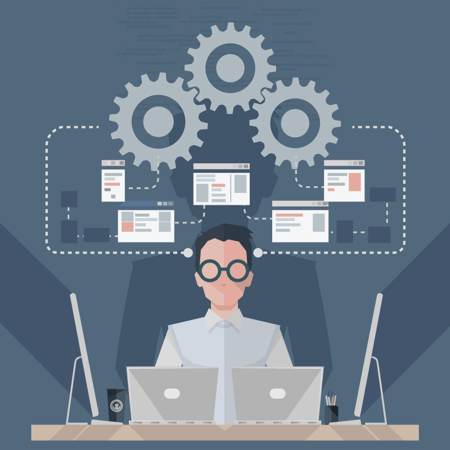
For IT contractors, staying up to date with the latest developments, technologies and innovations is part and parcel of your job description.
As the IT industry is ever changing, staying on trend is imperative. Likewise, staying informed about the latest developments and changes to your business’s tax considerations and requirements is equally important.
In 2017, public sector contractors’ tax status changed following amendments made to IR35 legislation. Under these reforms, IR35 now stipulates that it is the role of the ‘client’ to ensure that a contract meets the requirements of IR35 categorisation, where previously the onus was on the contractor to ensure that these requirements were met.
From April 2020 onwards, all contractors, operating in both public and private sectors, will be affected by these changes with IR35 consolidating a mandate that requires clients to ensure that any contract entered into is valid under IR35. The contractor tax sphere is, therefore, a complex and complicated paradigm that is constantly shifting and being updated.
Staying on top of these categorisations is hard work, and so too is understanding the various expenses you can claim for now that these classifications are shifting. In this post, our London’s local accountants for contractors aim to discuss the business expenses IT contractors can claim for both inside and outside of IR35 legislation, as well as what to do in the event that you find yourself unsure of your classification.
What is a business expense?
A business expense is a charge your business incurs while operating that is considered “ordinary and necessary” with respect to the running of the enterprise. You can claim these expenses back as deductions from your business’s yearly tax returns and thereby mitigate the overall tax payable on your annual returns.
As a contractor, a business expense is one that is incurred in the performance of your core service or on behalf of your client. You are able to claim back such expenses as deductions, meaning they can be taken from your gross profit before tax is applied. Just as your business’s structure will determine what type of taxes you are eligible to pay, your IR35 status will also determine which expenses you are allowed to claim.
What business expenses can IT contractors claim outside IR35?
As a contractor working outside of IR35, you are classified as operating a legitimate, genuine contractor business and as such, are not deemed to be a ‘disguised employee’ as defined by HMRC’s guidelines. This means that you have greater freedoms with respect to your rights as a business operator, improved tax efficiency and the expenses you can claim.
If your contract falls outside the scope of IR35, you can claim for a number of business expenses that can make a significant contribution towards reducing your overall taxable revenue, such as:
- Costs associated with setting up your company.
- Salaries of company employees (typically just yourself as a contractor – and only where applicable as specified by HMRC).
- Costs associated with an external accountant providing accounting and bookkeeping services.
- National Insurance Contributions (NICs) and contributions to a pension plan.
- Basic costs of operating a business such as business rent, utilities, Internet services, phones, insurance, office costs.
- Equipment costs such as PCs, laptops and software.
- Training expenses if they are directly related to your contract work.
- Subscription to HMRC-approved professional organisations or magazines related to your contract work.
- Costs of entertaining clients or potential clients.
- VAT on expenses if your company is VAT registered.
What expenses can IT contractors claim inside IR35?
As a contractor working inside of IR35 in the private sector, you can claim a fixed 5% to cover the cost of running a company (please note that this isn’t applicable to contractors working in the public sector). They can include:
- Costs of using your home as an office
- Administration and secretarial support
- Accountancy and tax advice
- Business development costs
- Printing, postage and stationery
- Telecoms
- Insurance
- Training costs
- Certain computer equipment
- Bank charges
- Hire purchase payments
Please note that travel and subsistence expenses cannot be claimed.
As per the changes to IR35 legislation with respect to contractors working in public sectors, if HMRC finds you to be working inside IR35 in a public sector occupation this 5% expense allowance cannot be claimed. As for the imminent changes to IR35 classifications in private sector jobs, this will likely transfer also, however, this is yet to be confirmed.
Do note that these lists are not exhaustive, and it is always advisable to consult your accountant with respect to the applicable expenses that you might be able to claim as a contractor business or limited company. If you’d like to know more about the expenses you might be eligible to claim when operating outside or inside the scope of IR35, contact one of our specialist accountants for contractors today.
Accountants for IT contractors
Becoming an IT contractor is as demanding as it is rewarding. While there are some significant benefits to working as a contractor, the financial and fiscal requirements of anyone operating their business can be overwhelming.
To be a successful IT contractor, balancing your business operations and financial responsibilities is key, and this is where Tax Agility can help. Our team of accountants work with contractors from all walks of life and what expenses you can or cannot claim is one of the enquiries we handle daily. If you’d like to know more, contact us on 020 8108 0090 today or drop us a line via our contact page.
If you found this useful, you might also like:
- How Xero can help contractors in the UK
- Moving from permanent employee to full-time contractor
- Tax planning tips for self-employed contractors
This post is intended to provide information of general interest about current business/ accounting issues. It should not replace professional advice tailored to your specific circumstances.
